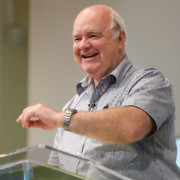A Real Darwinian Eye-opener at Malvern
 The 130 or so delegates who attended the Intelligent Design Annual Conference at Malvern, England, on September 28/29, 2012, were treated to a real Darwinian eye-opener from world-class speakers Dr Doug Axe (Biologic Institute, Seattle) and Prof John Lennox (Oxford). If you think neo-Darwinism is beyond scientific dispute and that the design debate is an irrelevance, you should have heard this.
The 130 or so delegates who attended the Intelligent Design Annual Conference at Malvern, England, on September 28/29, 2012, were treated to a real Darwinian eye-opener from world-class speakers Dr Doug Axe (Biologic Institute, Seattle) and Prof John Lennox (Oxford). If you think neo-Darwinism is beyond scientific dispute and that the design debate is an irrelevance, you should have heard this.
Particularly telling was Axe’s exposition of the current criticisms of Darwinian evolution in the scientific literature, made all the more powerful because they come from sources that do not apparently endorse Intelligent Design.
And the criticisms are not minor. Deep doubts about the accuracy of the universal tree of life, embarrassing discrepancies in the genetic data for the accepted evolutionary path from early apes to humans, and evidence that mutation and natural selection just cannot provide a mechanism for evolutionary change are among the major areas being elucidated. To support his argument, Doug Axe quoted a number of papers from respected and readily available scientific journals. These references will be made available in due course.
At one point Axe likened Darwinism to a chair which has had all its legs removed, but still manages to support all that rests on it. ‘Scientific levitation’, was the spontaneous reaction of a member of the audience. All very funny if it wasn’t so serious.
According to Axe, Darwinism is currently being revised beyond recognition. But the scientific consensus clings to certain non-negotiable dogmas, including the proposition that there is a tree of life and that it has a purely natural cause. So if you want to be recognised as a professional scientist, don’t stray beyond these boundaries, despite where you may think the evidence points. Is this really science or a crude distortion of its method?
In a session about an alternative design paradigm for biology and the evidence supporting it, Axe used an analogy about how all the world’s literature came to be assembled. In a Darwinian world, the compilation of all the world’s libraries from letters and text, through sentences, paragraphs, pages, books and collections, up to complete libraries would have to be attributed to a ‘bottom up’, multiple, simple typographical errors accumulating over long periods of time. In reality, of course, libraries arise from a ‘top down’ process of the expression and application of intelligent mind.
So, you might wonder, how is it that neo-Darwinian theory is maintained by the scientific community in the face of growing contrary evidence? Well, the conference explored the view that the answer lies in the implications of the design argument. It’s not that the evidence for design in nature is suspect. It’s just that its philosophical and religious implications make it unacceptable. No-one has put it better than the Harvard biologist, Richard Lewontin:
"It is not that the methods and institutions of science somehow compel us to accept a material explanation of the phenomenal world, but, on the contrary, that we are forced by our a priori adherence to material causes to create an apparatus of investigation and a set of concepts that produce material explanations, no matter how counter-intuitive, no matter how mystifying to the uninitiated. Moreover, that materialism is absolute, for we cannot allow a divine foot in the door."1
So there you have it. And John Lennox, in his brilliant survey of the controversy around the design argument, stressed that the essential problem is not the quality of the evidence, but the worldview that is brought to interpret the evidence. This tension is as old as the Greek philosophers and is ultimately about whether a creative cause beyond Nature can be considered.
There are only two possibilities. Either Nature is all there is, or there is an intelligent cause beyond Nature. Modern science has now endorsed the former, a position which is not only un-provable, but which flies in the face of the scientific evidence. Ironic too that almost all of the pioneers of modern science were theists who found their science possible and fulfilling because they detected cause, effect and rationality in the universe.
In a devastating critique of the New Atheism, Lennox claimed that political correctness paralyses rational debate and that materialism, with its reductionist agenda, actually undermines rationality. If what we recognise as rational thought is no more than random chemical processes in our brains, how can we regard any pronouncement as valid, including the conclusion that minds are the product of a purely material cause? The bottom line, as C S Lewis the Oxford don and Christian apologist contended years ago, is that the existence of reason within nature points to a need for reason outside of nature, such as a transcendent intelligent cause.
And natural law, Lennox pointed out, on which so many materialistic claims are built, can describe phenomena, but don’t explain how or why the laws exist in the first place. An understanding of how things work leaves the issue of causal agency unaffected. You can explain a Ford motor car, Lennox claims, in terms of the laws which govern motion and combustion, but you are still left with the need for the designer – Henry Ford and his successor engineers!
This was a thoroughly stimulating conference which dealt with the science of design and its profound implications. It also included extended periods of debate around the key issues arising from intelligent design, indicating that a growing body of informed opinion is sympathetic to the position. The proceedings of this conference will be made available as soon as practicable. Make sure you get them!
Some of the issues raised at this conference can be found in ‘Science and Human Origins’, a recent publication from Discovery Institute Press (2102). A comment by Doug Axe in that book provides a fitting summary of the ID conference. Writing about Darwin’s view of the world, he writes:
‘As someone who loves science, I have to say that I can think of no conclusion in the whole history of the discipline that is so firm and profound and so original that it should cause every human being to stop and rethink what it means to be human. Most simply aren’t that profound. I happen to think that Darwin’s was that profound, but thankfully, also profoundly wrong.’ (p43)
Alastair Noble
Director
Centre for Intelligent Design
Biographical Note
 Dr Doug Axe is the director of the Biologic Institute, Seattle USA. After a Caltech PhD he held postdoctoral and research positions at the University of Cambridge, the Cambridge Medical Research Council Centre, and the Babraham Institute in Cambridge. Doug's work has been reviewed in Nature and featured in a number of publications.
Dr Doug Axe is the director of the Biologic Institute, Seattle USA. After a Caltech PhD he held postdoctoral and research positions at the University of Cambridge, the Cambridge Medical Research Council Centre, and the Babraham Institute in Cambridge. Doug's work has been reviewed in Nature and featured in a number of publications.
 Prof John Lennox is Professor of Mathematics at Oxford University, a Fellow in Mathematics and Philosophy of Science at Green Templeton College, Oxford University and acclaimed author of numerous titles including, ‘God and Stephen Hawking: Whose Design is it anyway?’.
Prof John Lennox is Professor of Mathematics at Oxford University, a Fellow in Mathematics and Philosophy of Science at Green Templeton College, Oxford University and acclaimed author of numerous titles including, ‘God and Stephen Hawking: Whose Design is it anyway?’.
John has debated the issues of this conference with leading evolutionary theorists including Richard Dawkins, the late Christopher Hitchens and Peter Singer.
1 Billions and Billions of Demons" in The New York Review of Books, 9 January 1997, p31
Image credits:
Thumbnail and Elim Conference Centre - by kind permission of Elim International Centre, Malvern
Doug Axe - courtesy of Discovery Institute
John Lennox - © John Cairns